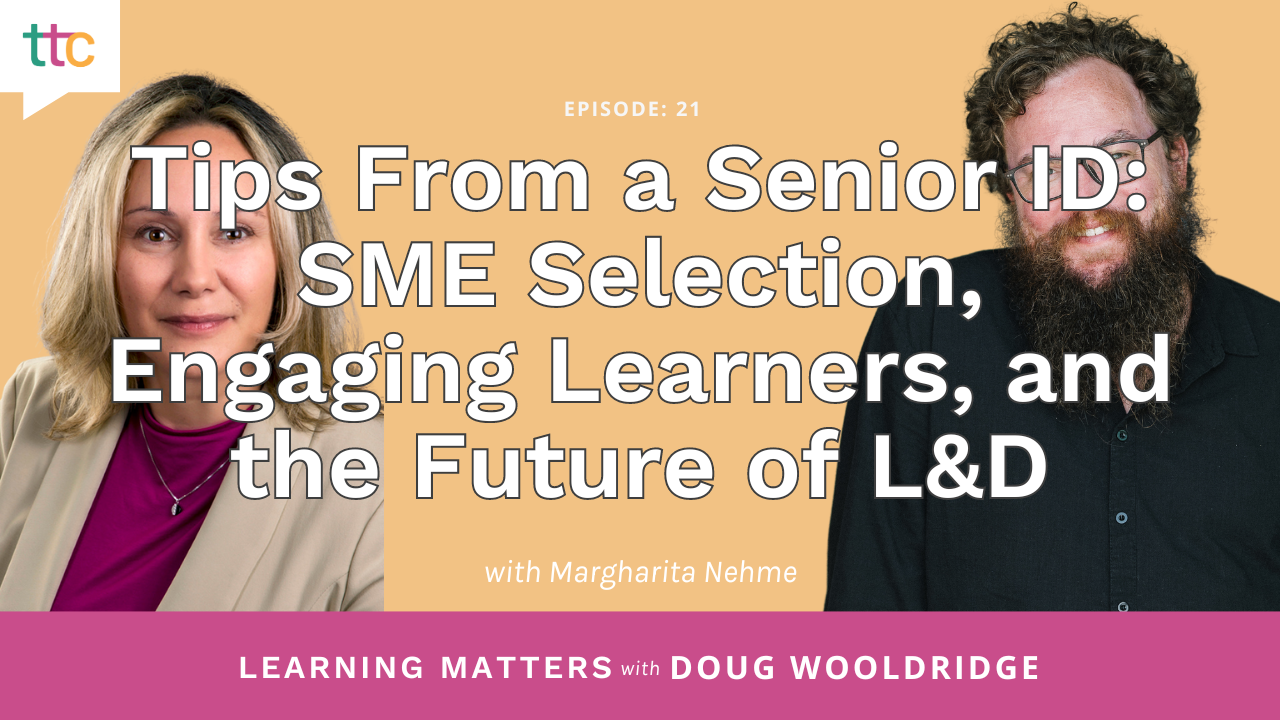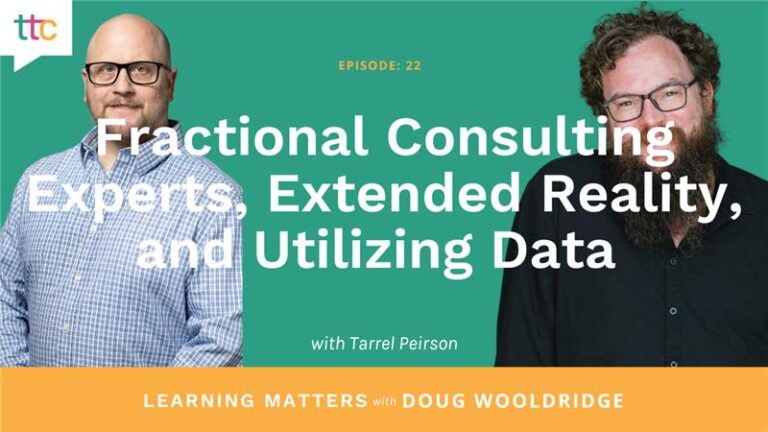Apple Podcasts | Spotify | YouTube
This week we’re joined on the podcast by Margharita Nehme. Margharita is a Certified Professional in Talent and Development (CPTD) and an accomplished learning design and technology specialist. She holds a Master’s of Educational Technology and has over 15 years of experience in providing results-driven and impactful learning experiences. Her expertise includes creating, implementing, and evaluating training programs, learning blueprints, and technology integration. She’s also one of ttcInnovations’ Senior IDs.
Comparing Higher Education and Corporate Adult Learning
When it comes to adult learning, there’s a noticeable difference between what you’d find in a traditional higher education setting versus a corporate training environment. In academia, the focus is often on deepening theoretical knowledge and sparking intellectual curiosity. On the other hand, the corporate world is all about being practical—people want to pick up skills they can immediately use in their jobs.
The motivation levels of adult learners in these two spaces can be quite different as well. University students might be driven by personal goals, societal expectations, or just a love for learning. They might be pursuing knowledge for its own sake or to advance their careers down the line. But in the corporate world, motivation is usually more straightforward. Employees are looking to boost their job performance, learn new technologies or processes, or meet specific goals set by their organization.
In corporate settings, the content and delivery of training programs are laser-focused on real-world challenges and immediate business needs. Unlike the more theory-heavy approach in higher education, corporate training is all about practical applications, hands-on experiences, and solutions that learners can immediately put to use in their work. This approach ensures that what’s learned translates directly into better performance and tangible results within the organization.
Evolution of Learning and Development
Corporate training has come a long way, especially in recent years, thanks to changing learner needs and the rise of new technologies. One of the biggest shifts has been moving away from traditional classroom settings to more digital and collaborative learning experiences.
In the past, corporate training often meant sitting in a room and listening to an instructor deliver a lecture. But now, with digital platforms and online learning tools, organizations are embracing more flexible, engaging ways to train their employees.
Today’s learners expect their training to be accessible, interactive, and tailored to their needs. This demand has led companies to invest in e-learning modules, virtual classrooms, and learning management systems, which allow employees to learn at their own pace and on their own devices.
Collaboration and social learning have also become much more important. Employees now have the chance to engage in online discussions, share knowledge, and learn from each other through social media, forums, and collaborative tools.
But the changes in corporate training aren’t just about how the content is delivered. A big part of successful training is the analysis phase, where the goals of the client and the needs of the learners are carefully considered. This step is crucial for making sure that the training content is relevant, practical, and aligned with what the organization is trying to achieve.
Understanding the client’s goals is key to designing effective training programs. Whether the aim is to improve employee performance, introduce new processes, or build a certain organizational culture, the training needs to support these objectives.
Similarly, analyzing the learners’ needs is essential for creating engaging and impactful training experiences. Factors like prior knowledge, learning preferences, and job roles help determine the best approach to training delivery and content design.
By thoroughly analyzing both the client’s goals and the learners’ needs, training professionals can spot gaps, address specific challenges, and create training solutions that truly resonate with learners and deliver real results for the organization.
Working with Subject Matter Experts (SMEs)
One of the most important aspects of developing successful training programs is working with Subject Matter Experts (SMEs). These are the folks who have deep knowledge and expertise in the subject that needs to be turned into training materials. But, because SMEs are often busy professionals with tight schedules, getting their time and attention can be tough.
Building strong relationships with SMEs is crucial for successful training development. It’s important to set clear expectations right from the start—let them know how much time they’ll need to commit and what specific deliverables are expected. Regular communication and flexibility with scheduling can help accommodate their busy lives.
Showing a genuine interest in their expertise and respecting their time goes a long way in building a positive working relationship. SMEs are more likely to be engaged and cooperative if they feel valued and understood. Explaining how their input will benefit the learners and the organization can also motivate them to participate fully.
Being prepared and organized when working with SMEs is also key. Having a clear agenda and specific questions ready can help make the most of your time with them. Encouraging them to share real-world examples and practical scenarios can add depth and relevance to the training materials.
Ultimately, working with SMEs requires patience, good communication, and a collaborative attitude. By valuing their expertise, respecting their time, and fostering a strong working relationship, training professionals can tap into the knowledge of SMEs to create engaging and impactful learning experiences.
The Next Era of Corporate Learning
The future of learning and development is set for some big changes, driven by the evolving needs of learners and rapid technological advancements. One major trend shaping the future of L&D is the growing emphasis on personalization.
Learners today expect experiences tailored to their unique learning styles, preferences, and goals. The old one-size-fits-all approach is being replaced by adaptive learning platforms that use AI and machine learning to deliver personalized content and learning paths. These platforms analyze learner behavior, performance, and feedback to continually fine-tune the learning experience, ensuring that each individual gets the most relevant and effective training.
Flexibility is also a crucial aspect of the future of L&D. With the modern workforce becoming increasingly mobile and dispersed, learning solutions need to be accessible anytime, anywhere, and on any device. Microlearning—bite-sized learning nuggets delivered through mobile apps or other digital platforms—is gaining popularity as a way to provide just-in-time training and support performance on the job.
Additionally, social learning is becoming more important. Learners today want opportunities to collaborate, share knowledge, and learn from one another. Social learning platforms and communities of practice allow peer-to-peer learning, enabling learners to engage in discussions, share resources, and tap into the collective wisdom of their peers.
Gamification—the use of game-like elements in non-game contexts—is also expected to play a significant role in the future of L&D. By incorporating things like badges, leaderboards, and challenges, gamification can boost learner engagement, motivation, and retention, making the learning experience more enjoyable and effective.
Ultimately, the future of L&D will be all about putting the learner at the center, using technology to deliver personalized, flexible, and engaging learning experiences that align with the needs of today’s workforce.
Staying Innovative in Adult Learning
To stay innovative in adult learning, it’s important to cultivate a mindset of curiosity and openness to change. The field is constantly evolving, with new technologies, methodologies, and learner preferences emerging all the time. Embracing a growth mindset and committing to continuous learning can help you stay ahead and deliver relevant, engaging learning experiences.
Curiosity is the driving force behind innovation. By staying curious about new trends, research, and best practices in adult learning, you can spot opportunities for improvement and explore new approaches to learning design and delivery. Asking questions, seeking diverse perspectives, and challenging assumptions can lead to fresh insights and creative solutions.
Openness to change is equally important. As learner and organizational needs shift, adult learning professionals must be willing to adapt their strategies and embrace new technologies or methodologies. Sticking to outdated practices or resisting change can hold you back. Being open to change and willing to experiment can unlock new possibilities and keep learning experiences relevant and effective.
Continuous learning is essential for staying innovative. Adult learning professionals should actively seek out opportunities for professional development—whether that’s attending conferences, workshops, or webinars, participating in online communities, or pursuing additional certifications or degrees. Engaging with industry thought leaders, researchers, and peers can provide valuable insights and inspiration for innovation.
Reflecting on your own experiences and learnings can also foster growth and innovation. Regularly evaluating the effectiveness of your learning interventions, gathering feedback from learners and stakeholders, and analyzing data can help you identify areas for improvement and inform future innovations.
By nurturing curiosity, embracing change, and committing to continuous learning, adult learning professionals can stay innovative and deliver cutting-edge, impactful learning experiences that meet the evolving needs of learners and organizations.






